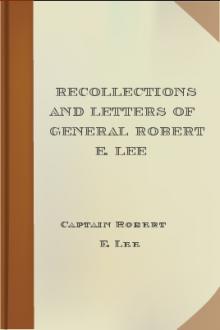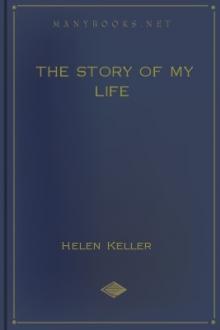Recollections and Letters of General Robert E. Lee by Captain Robert E. Lee (howl and other poems .txt) 📕

- Author: Captain Robert E. Lee
- Performer: -
Book online «Recollections and Letters of General Robert E. Lee by Captain Robert E. Lee (howl and other poems .txt) 📕». Author Captain Robert E. Lee
“Very affectionately,
“R. E. Lee.”
On one of his visits to my mother, he took advantage of the comparative quiet and rest there and wrote me a long letter, which I give her in full:
“Rockbridge Baths, July 28, 1866.
“My Dear Robert: I was very glad to see from your letter of the 2d the progress you are making in your farm. I hope things may move prosperously with you, but you must not expect this result without corresponding attention and labour. I should like very much to visit you, but it will be impossible. I have little time for anything but my business. I am here with your mother, waiting to see the effects of these waters upon her disease, before proceeding to the Warm Springs.
She is pleased with the bath, which she finds very agreeable, and it has reduced the swelling in her feet and ankles, from which she has been suffering for a long time, and, in fact, from her account, entirely removed it. This is a great relief in itself, and, I hope, may be followed by greater. I do not think she moves with more facility, though I think she walks [on her crutches] oftener and longer than heretofore, and probably with more confidence. She has been her too short a time to pronounce positively as to the effects of the water, and will have to remain three or four weeks before we determine whether she will go further. I am unwilling for her to lose the whole summer here unless it promises some advantage, and, after the middle of next week, unless some marked change takes place, shall take her to the Warm Springs. Custis has gone to the White Sulphur, but expects to be in Richmond on August 6th to meet Fitzhugh, with the view of going to the Warrenton White Sulphur Springs in North Carolina, to witness the erection of a monument over dear Annie, which the kind people of that country have prepared for the purpose. My attendance on your mother, which is necessary, prevents my being present. Agnes and Mildred are here. I think the baths have been beneficial to them already, though they have not been here a week. I will leave them to describe the place and visitors. I applied the dressing of salt to the old meadow at Arlington with the view of renovating the grass.
I believe it is equally good for corn. It was refuse salt—Liverpool—
which I bought cheaply in Alexandria from the sacks having decayed and broken, but I cannot recollect exactly how much I applied to the acre. I think it was about two or three bushels to the acre. You had better consult some work on farming as to the quantity. I would advise you to apply manure of some kind to all your land. I believe there is nothing better or cheaper for you to begin with than shell lime.
I would prefer cultivating less land manured in some way than a large amount unassisted. We are always delighted to hear from you, and I trust with care you may escape the chills. The incentives I spoke of were a sweet wife and child. God bless you, my dear son.
“Most affectionately, “R. E. Lee.”
My mother continued to improve so much that she did not go that summer to the Warm Springs. My father spent most of his time in Lexington, but rode over to the Baths about once a week. There was nothing he enjoyed more than a good long ride on Traveller. It rested him from the cares and worries incident to his duties, and gave him renewed energy for his work. He was often seen that summer along the eleven miles of mountain road between Lexington and the Baths. He made himself acquainted with the people living near it, talked to them about their affairs, encouraged and advised them, and always had a cheery greeting and a pleasant word for them. The little children along his route soon became acquainted with the gray horse and his stately rider. College reopened the last of September and by October he had his wife and daughters with him again. He write to me on October 18th, trying to help me in my agricultural perplexities: “…Am glad to hear that you are well and progressing favourably. Your Uncle Smith says, in a letter just received in which he writes of his difficulties and drawbacks, ‘I must tell you that if you desire to succeed in any matter relating to agriculture you must personally superintend and see to everything.’ Perhaps your experience coincides with his.
“I hope your wheat will reimburse you for your labour and guano. I think you are right in improving your land. You will gain by cultivating less and cultivating that well, and I would endeavour to manure every crop—as to the kind of manure which will be the most profitable, you must experiment. Lime acts finely on your land and is more lasting than guano. If you can, get shells to burn on your land, or, if not, shell lime from Baltimore. I think you would thereby more certainly and more cheaply restore your fields. I hope your sale of ship-timber may place you in funds to make experiments. You will have to attend to your contractors. They will generally bear great attention, and then circumvent you…. I hope I shall see you this winter, when we can talk over the matter. We are pretty well. Your mother is better by her visit to the Baths. Mildred talks of going to the Eastern Shore of Maryland next month, and I fear will be absent from us all winter. I must refer you to your sisters for all news. They are great letter-writers, and their correspondence extends over the globe.
Miss Etta Seldon is with us. All our summer visitors have gone, and some who, I hoped, would have visited us have not come…. Good-bye, my dear son. God bless you….
“Your affectionate father, “R. E. Lee.”
“Robert E. Lee, Jr.”
My uncle, Smith Lee, was farming on the Potomac, and was constantly sending me messages of condolence through my father. Our experiences were the same as all others starting to farm under the new order of things. My father was very hospitable, and it delighted him to have his relatives and friends come and see him. So many kindnesses had been shown to himself and family for the last five years that he greatly enjoyed this, his first opportunity of greeting in his own home those who had so often offered my mother and sisters the shelter of theirs.
The country around Lexington was most beautiful, and the climate in the summer and autumn all that could be desired. So, at those seasons, whenever he was at home, there was generally some one visiting him, nearly always relatives or old and dear friends. He entertained very simply, made every one feel at home, and was always considerate and careful of the amusement and welfare of his guests.
People came from all over the world to Lexington to see him. Amongst the visitors from afar were the marquis of Lorne and the Hon. Mr.
Cooper, who were on a tour through the United States. They came to Lexington to see General Lee. When they called at the house there happened to be no servant at hand, and my father, meeting them at the door, received their cards. Not having on his glasses, he could not read the names, but ushered the strangers into the parlour, and presented them to Mrs. Lee, without calling their names. My mother thought the tall, slender youth was a new student, and entered into conversation with him as such. Struck by his delicate appearance, she cautioned him against the harsh winter climate of the mountains, and urged him to be careful of his health. On this, Mr. Cooper explained who his companion was, and there was much amusement over the mistake.
The professors and students of the two institutions of learning were constant visitors, especially in the evenings, when young men came to see the girls. If his daughters had guests, my father usually sat with my mother in the dining-room adjoining the drawing-room. When the clock struck ten he would rise and close the shutters carefully and slowly, and, if that hint was not taken, he would simply say “Good night, young gentlemen.” The effect was immediate and lasting, and his wishes in that matter, finally becoming generally known, were always respected. Captain W., who had very soon found out the General’s views as to the time of leaving, was told on one occasion that General Lee had praised him very much.
“Do you know why?” said the Captain. “It is because I have never been caught in the parlour at ten o’clock. I came very near it least night, but got into the porch before the General shut the first blind. That’s the reason he calls me ‘a fine young man.’”
A young friend who was a cadet at the Virginia Military Institute called on my sisters one evening, and remarked, just for something to say: “Do you know this is the first civilian’s house I have entered in Lexington.”
My father was in the room in the room in his gray Confederate coat, shorn of the buttons; also my two brothers, Custis and Fitzhugh, both of whom had been generals in the Confederate Army; so there was quite a laugh over the term CIVILIAN. I have already mentioned how particular my father was about answering all letters. It was a great tax on his time, and some of them must have been a trial to his temper. The following will explain itself:
“Lexington, Virginia, September 5, 1866.
“A. J. Requier, 81 Cedar St., New York.
“My Dear Sir: I am very much obliged to you for your kind letter of the 22d ult. So many articles formerly belonging to me are scattered over the country that I fear I have not time to devote to their recovery. I know no one in Buffalo whom I could ask to reclaim the Bible in question. If the lady who has it will use it, as I hope she will, she will herself seek to restore it to the rightful owner. I will, therefore, leave the decision of the question to her and her conscience. I have read with great pleasure the poem you sent me, and thank you sincerely for your interest in my behalf. With great respect,
“Your obedient servant, “R. E. Lee.”
Here is another one of many of a similar character: “Lexington, Virginia, September 26, 1866.
“Mr. E. A. Pollard, 104 West Baltimore St., Baltimore, Md.
“Dear Sir: I return you my thanks for the compliment paid me by your proposition to write a history of my life. It is a hazardous undertaking to publish the life of any one while living, and there are but few who would desire to read a true history of themselves.
Independently of the few national events with which mine has been connected, it presents little to interest the general reader, nor do I know where to refer you for the necessary materials. All my private, as well as public, records have been destroyed or lost, except what is to be found in published documents, and I know of nothing available for the purpose. Should you, therefore, determine to undertake the work, you must rely upon yourself, as my time is so fully occupied





Comments (0)